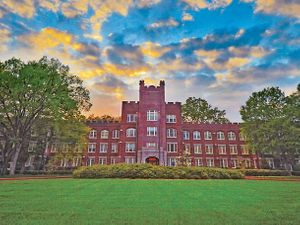
Seven million pounds of garbage – 961 refrigerators, 143 sinks, 67,000 tires, 3,700 55-gallon barrels, 63 messages in bottles and much, much more. That's how much trash Chad Pregracke and his organization have dredged up from the Mississippi and 16 other major rivers over the past 15 years.
This dedicated river champion has been featured on CNN, the Discovery Channel, National Geographic, ABC, CBS and NBC. He was awarded the Jefferson Award for Public Service, a prize that is considered the U.S. equivalent of the Nobel Prize for public service.;
Speaker at National Environmental Summit
;Pregracke will talk about his passion to clean up the Mississippi and what it takes to make a difference in the world at the National Environmental Summit for High School Students in July at Catawba College. A collaborative venture of the Center for the Environment at Catawba and Rocky Mountain Institute in Colorado, the summit is designed to help students from across the country learn how they can use their talents to effect positive change in the world.
Pregracke's epic voyage into river clean-up started when he was 17 years old. He worked as a shell diver in the Mississippi River near his home in Hampton, Ill., to earn money for college. Returning home one evening in his boat, he saw a huge pile of barrels near yachts that were moored at a marina. "The barrels had been sitting there for 50-60 years, and I got sick of seeing it," Pegracke says.
"I thought, 'I can't be the only one who doesn't like seeing that. I want to change it.'"
That decision catapulted the teenager into his life's work. Pregracke founded Living Lands & Waters, a non-profit environmental organization, in 1997. He now oversees an organization with 12 full-time staff, six work boats, four barges, two tugboats, a crane, a fleet of trucks and an annual operating budget of $1.6 million.
During the organization's 15-year history, more than 70,000 volunteers have participated in 740 river clean-ups. The organization also plants trees and conducts educational workshops. "We have given away or planted 500,000 trees," he says.
Persistence Paid Off
;It took Pregracke a long time to get government officials to listen to his concern about the Mississippi. "It took me four years of calling state officials for them basically to say, 'Who are you, kid, and what problem are you talking about?'"
Initially he had no money to conduct his clean-ups. Then one day he saw a NASCAR race and that gave him an idea. The NASCAR racers had sponsors, so he figured he would get sponsors, too.
He started calling places and finally found someone who would support his efforts. Now corporate sponsors like Alcoa, Anheuser-Busch, Cargill and many others fund the work of his organization. "I never set out to found an organization," he says. "I just did what I had to do. It grew out of necessity."
What has he learned from the experience? "Anything is possible, anything you set your mind to," he says. "You just set big goals and work hard to achieve them."
Because of Pregracke's achievements, he has met presidents and rock stars and other well known people, but it hasn't gone to his head. "I may get a lot of credit, but I know it's not me that's doing all this," he says. "It's 70,000 volunteers. I only accept awards and things like that on behalf of the people who make it happen. I'm just really fortunate."
What does he hope the high school students at the summit will take away from his presentation? "Volunteering is important, especially at their age," he says. "My deal is about taking action. If you see a problem, know you can do something about it. I think my story is a good example that we all do make a difference. It's up to them how big a difference they want to make.
"I try to be upbeat," he says. "The problem I'm working on is simply made by humans, but it can also be fixed by humans. And that's exactly what we're doing."
The Center for the Environment at Catawba College was founded in 1996 to provide education and outreach centered on prevalent environmental challenges and to foster community-oriented sustainable solutions that can serve as a model for programs throughout the country. For more information, visit www.CenterForTheEnvironment.org or www.CampaignForCleanAir.org.
RELATED CONTENT:
National Environmental Summit for High School Students
Sustainable Catawba
